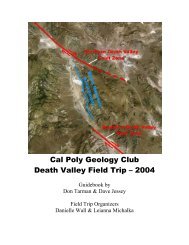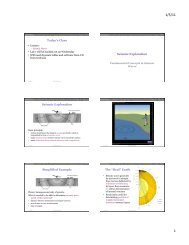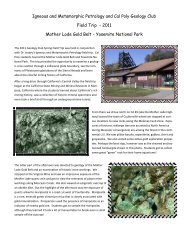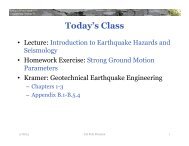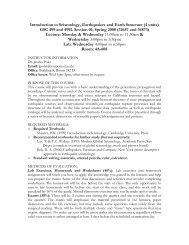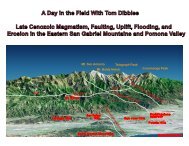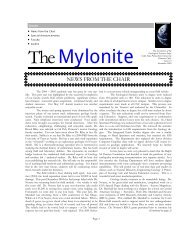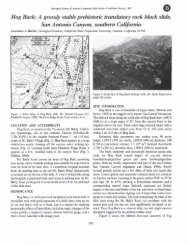Appendices to Qualitative Program Indicators - Geological Sciences ...
Appendices to Qualitative Program Indicators - Geological Sciences ...
Appendices to Qualitative Program Indicators - Geological Sciences ...
Create successful ePaper yourself
Turn your PDF publications into a flip-book with our unique Google optimized e-Paper software.
Fresh Starts - Hiring in Hydrology Resists the Slump - NYTimes.com<br />
http://www.nytimes.com/2009/03/08/jobs/08start.html_r=2&sq=water&st=cse&scp=8&pagewanted=print<br />
Page 1 of 3<br />
3/12/2009<br />
March 8, 2009<br />
FRESH STARTS<br />
Hiring in Hydrology Resists the Slump<br />
By EILENE ZIMMERMAN<br />
THE Earth may be two-thirds water, but only about 1 percent of that water is actually usable for human<br />
consumption and agriculture. What’s more, as the planet warms and the population shifts, even that 1<br />
percent is at risk.<br />
That is why demand for hydrologists has been predicted <strong>to</strong> grow 24 percent from 2006 <strong>to</strong> 2016, much faster<br />
than the average for all occupations, according <strong>to</strong> the Bureau of Labor Statistics.<br />
Hydrologists study the distribution, circulation and physical properties of water, with hydrogeologists<br />
focusing specifically on groundwater. (According <strong>to</strong> the United States <strong>Geological</strong> Survey, there is 100 times<br />
more water beneath the ground than there is in all the world’s lakes and rivers.)<br />
“Hydrologist is a fairly broad term, but generally, any research or problems having <strong>to</strong> do with water, there’s a<br />
hydrologist working on it,” said Matthew C. Larsen, a hydrologist and associate direc<strong>to</strong>r for water at the<br />
<strong>Geological</strong> Survey.<br />
Most hydrologists did not earn degrees in hydrology; in fact, only a handful of undergraduate and graduate<br />
hydrology programs exist across the country. It is far more common for hydrologists <strong>to</strong> come from a hardscience<br />
or engineering background. Though it is possible <strong>to</strong> enter the field with a bachelor’s degree — most<br />
often as a lab technician — moving up in the career requires an advanced degree, Mr. Larsen said.<br />
After creation of the Environmental Protection Agency in 1970 and passage of the Clean Air Act in 1977 and<br />
Superfund legislation in 1980, hydrologists’ work was largely focused on water quality. Today, however, “an<br />
increasing percentage of hydrologists are interested in water quantity and supply, which is an emerging issue<br />
and where global climate change plays a big role,” said Dork Sahagian, professor of earth and environmental<br />
science at Lehigh University and direc<strong>to</strong>r of its Environmental Initiative in Bethlehem, Pa.<br />
“But concern with water quality — which involves local, site-based issues — still drives the job market,” he<br />
said. “Most hydrologists in this part of the world are still hired <strong>to</strong> cope with the availability of clean water for<br />
drinking and municipal supplies.”<br />
Hydrologists use samples of water and soil, which they have traditionally collected themselves by wading out




